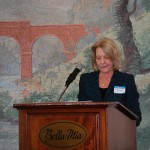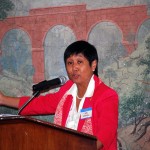Christine Tarver said she had considered getting a doctor of nursing practice degree for years when she heard the CSU system had something in the works.
“The timing worked and the stars aligned,” she said. “I always knew I would get one more degree.”
Tarver, who already had a master’s degree, is part of the second cohort of DNP students enrolled in the California State University Northern California Consortium Doctor of Nursing program, a joint effort between San José State University and CSU Fresno.
“The other (DNP) programs were in the city (San Francisco) and one was not affordable,” she said, noting that the online format of the CSU program allowed her to continue working while she earns her degree. “We have faculty from all over because it’s virtual.”
Tarver said she works in administration and she jokes with her hospital director that she just wants to change the world.
But that is not far from the goals of the program. One of the key requirements of the DNP program is that in their five semesters in the program, students undertake a research project that has a direct link to changing healthcare outcomes.
“When I’m talking to a potential student, I talk about the project,” said Ruth Rosenblum, the acting director of the SJSU DNP program. “It is about improving patient outcomes – there needs to be a direct line.”
Mae Lavente is in her first semester with the program, part of the third cohort. She is a nurse practioner who is most excited about the research component of the program. Her project involves delirium and the logistics of musical therapy.
“I want to shape it so it’s not just conceptual, but practical,” she said.
She said the first semester has been challenging.
“It’s been a struggle because I’ve been out of school for so long,” she said, noting she finished her last degree 12 years ago. “I need to get back in the groove.”
When she completes her DNP, she said she wants to teach the next generation of nurses.
The DNP program launched its pilot in 2012, with the first cohort of students graduating in May 2014. Four of the May graduates joined the College of Applied Sciences and Arts Valley School of Nursing professors at a reception and showcase Oct. 15 where they shared their experience with current and prospective students.
-

-
Interim Dean Alice Hines welcomes guests the Valley Foundation School of Nursing doctor of nursing practice reception and showcase on Oct. 15.
-

-
Graduates from the first cohort of the DNP program take questions from current and prospective students at the reception.
-

-
Director of the Valley Foundation School of Nursing Kathy Abriam-Yago talked about the importance of the DNP program in the community.
-

-
Guests mingle at the Valley Foundation School of Nursing doctor of nursing practice reception and showcase Oct. 15.
“Today is a celebration of nursing in our community,” said Kathy Abriam-Yago, the director of the Valley Foundation School of Nursing, at SJSU. “It is a celebration of nursing excellence.”
Christine Mallon, the CSU Associate Vice Chancellor of Academic Programs and Faculty Development, attended the reception to talk about the inception of the DNP program.
“It took a few years to develop,” Mallon said.
It also took an act of the state legislature to authorize the CSU to award a Doctor of Nursing Practice degree. The state assembly bill itself called for a DNP degree to be distinct from the doctor of philosophy degree offered by the UC system and to allow professionals to earn the degree while working full time. The program allows students to do much of their coursework online, with in-person intensive sessions each semester held alternately at SJSU and CSU Fresno. The first cohort included students from as far north as Redding and as far south as Bakersfield.
“People know nurses and know their value,” Mallon said. “But they are not just giving one person a better experience – with research we get better outcomes (for many.)”
As part of the evening event, the four graduates were introduced by Rosenblum, who shared a summary of their research projects. The graduates then took questions from the audience members, including prospective students who are interested in applying for the fourth cohort.
Lisa Walker-Vischer, a graduate of the program last year, said she started working on her degree without a specific goal in mind.
“I had considered a PhD,” she said. “Part of the piece for me was two years versus four or five years. I loved the application and I am one of those who was transformed. I wasn’t looking for another job, but I got drawn into this.”
Walker-Vischer’s project focused on the experience of Latino parents of hospitalized children during family-centered bedside rounds.
She had been a clinical nurse specialist in pediatric care for nine years. As she was nearing the end of her program, she was offered a position as the director of the Center for Nursing Excellence at Lucile Packard Children’s Hospital Stanford.
Suzette Urquides, whose research focused on treatment times for adult patients directly transferred to cardiac catheterization laboratories versus the emergency room, said she selected the SJSU-Fresno program because of the emphasis on research.
“I saw things I couldn’t prove and I didn’t have a voice,” she said. “I knew this degree would allow me to have a voice at the table.”
Working for a hospital in Salinas, she said she hopes to share her knowledge as a consultant at other hospitals in the region.
“I’ve been a nurse’s aide and now I’m a doctoral practioner,” she said. “I’ve seen it all.”



